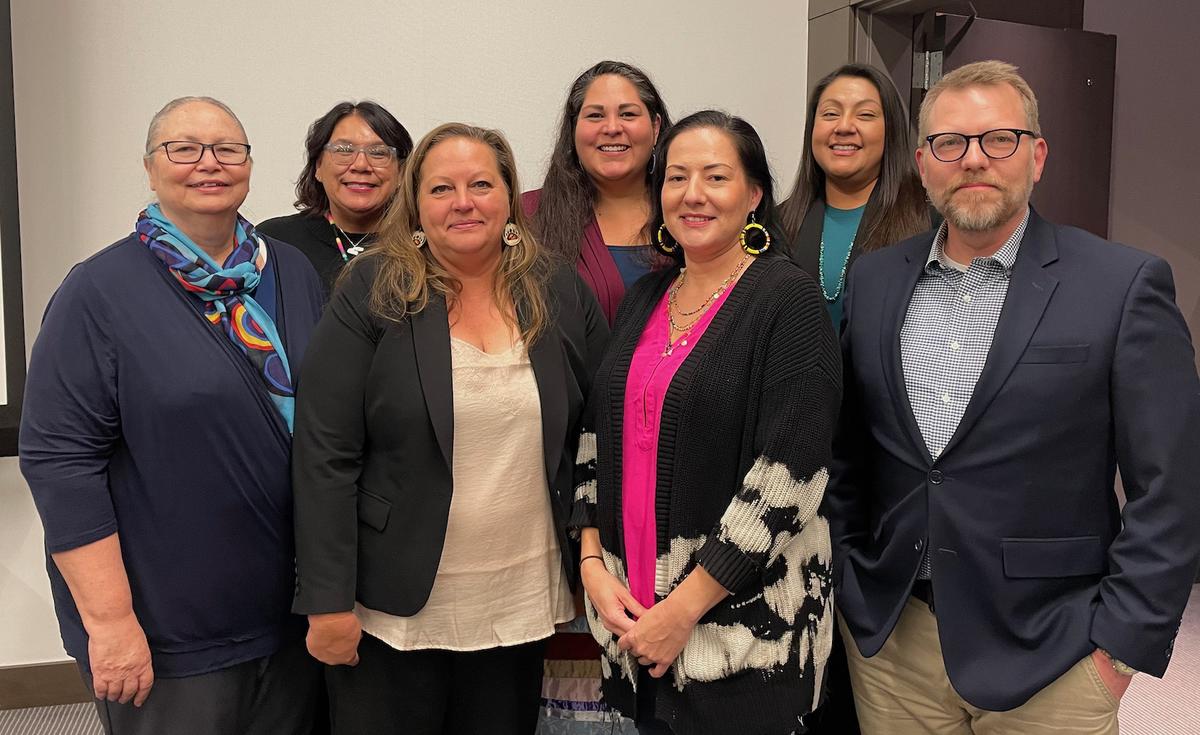“The removal of Indian children from their natural homes and tribal setting has been and continues to be a national crisis.” These words were published in a 1976 federal task force report. Two years later, the Indian Child Welfare Act (ICWA) was passed. This legislation has been a critical tool over the last four decades for preserving Native families and culture.
At the time the law was implemented, roughly one-third of Native children were being stripped from their homes—typically to be placed with white families or in boarding schools far from their communities.
Progress has been made but in Minnesota today, American Indian children are still 16.8 times more likely to be removed from their homes and placed into foster care than white children.
Rectifying this alarming disparity has long been the impetus behind Priscilla Day’s career. “Together I really believe we can change this,” the professor emeritus of the UMD Department of Social Work said in her introductory remarks before a daylong meeting in November between Minnesota’s ICWA Tribal Advisory Council and federal leaders from the Biden Administration.
“I started this work 30 years ago,” Day continued. “I’m very sad to be hearing the same things from our community today. I carry the pain of our grandmothers. We need to do something different in Minnesota.”
Day consults on tribal child welfare issues at a state and national level. Her efforts have had an indelible impact on the Department of Social Work’s curriculum and—with the support of tribal leaders—helped spur UMD’s Tribal Training and Certification Partnership (TTCP).
The TTCP has received a legislative appropriation to provide its two-day ICWA training to all child welfare professionals in Minnesota. It's a rare professional development opportunity that includes historical context about the intergenerational trauma American Indian people experience as well as a cultural lens for understanding and family preservation. Minnesota is the only state to offer such extensive training.
Innovating for Change
Day attended the November meeting along with staff from the TTCP, including Director Jeri Jasken, to assist members of the ICWA Tribal Advisory Council. Members were there to share the unique ways their tribal communities are working to protect children and strengthen Native families.
The council, which represents Minnesota’s tribal child welfare programs, is made up of representatives from 11 regional tribes as well as urban Indigenous representatives from Minneapolis, St. Paul and Duluth. Two council members are UMD social work graduates and one is a current student. All are passionately committed to the work.
Secretary January Contreras from the Administration for Children and Families (ACF) and Aysha Schomburg, associate commissioner for the Children's Bureau, listened intently and pledged support. Schomburg pointed out that it’s especially salient for the administration to understand the challenges tribes are facing in this arena as the Supreme Court is currently reviewing ICWA’s constitutionality.
What’s Working for Communities
Each tribal community has strengths and unique practices, according to Day. She noted that culture can help restore the balance that was taken away from Native families.
The way tribes are integrating culture throughout their services was a key theme at the meeting. Culture is being used as a protective and healing factor for children and families.
Cheri Goodwin, UMD alumna and director of Family and Children Services for the Red Lake Nation, spoke about the need to rethink child welfare and provide resources and funding to uplift “not just the child but the whole family.” She urged a shift to think of child welfare workers “not as child protection but as family reunification workers.”
The Red Lake Nation uses appreciative inquiry—a model that focuses on family and community strengths rather than weaknesses. According to Goodwin, services are healing-centered and rooted in the Anishinaabe language and culture. This approach has served the Red Lake Nation well by reducing out-of-home placement by 60 percent. When its children are identified as being at risk, they are placed with a relative or in an ICWA foster home 94 percent of the time.
White Earth Nation was experiencing one of the highest county-initiated, out-of-home placement rates for American Indian Children in the state two decades ago, but with the implementation of the American Indian Child Welfare Initiative in 2008, White Earth received base funding from the legislature to financially support both a tribal approach to child welfare work as well as exercising of exclusive tribal jurisdiction.
Jasken, who is a UMD alumna, previously served as director of the White Earth Child Welfare program and Behavioral Health programs. She helped to implement several unique programs for her tribe, which “resulted in reduced placement numbers, implementation of a cultural service model and family preservation supports,” according to Jasken.
Contreras said the visit to Minnesota presented an opportunity to learn about and elevate such best practices. Videographers were on hand to interview council members so that ACF can help to tell the story of tribal leadership beyond Minnesota and hold it up as a model for other communities.
The feature photo is from the November 2022 ICWA Tribal Advisory Council meeting. From left to right: Professor Emeritus Priscilla Day, Cheri Goodwin (Red Lake Nation), Jeri Jasken (TTCP), Laurie York (White Earth Nation), Lynn Braveheart (St. Paul urban representative), Lauretta Blakely (White Earth Nation), and Mark Erickson (TTCP).
All are UMD alumni from the Department of Social Work, with the exception of York, who is a current Master of Social Work student.
